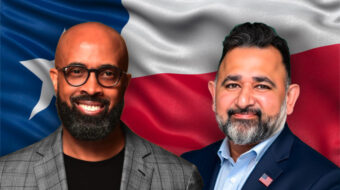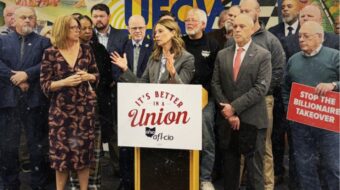‘800-pound gorilla’ sits on bargaining table
NEW YORK — Union leaders here have made it clear that the AFL-CIO’s Labor Day pledge to push for national health care by 2009 is high on labor’s agenda for the 2008 elections.
“The rising cost of health care is an 800-pound gorilla sitting on top of our bargaining tables,” declared Roger Toussaint, president of Transport Workers Union Local 100, during a Nov. 30 conference here sponsored by Cornell University’s School of Industrial and Labor Relations.
“For reasons of history,”
Toussaint said, “the U.S. has had a private model of health care as opposed to the social model in place in most of the industrialized world. And for reasons of history, labor has been compliant with that model. Now is the time to change that model.
“The first step now is to put pro-labor forces in office in Washington, the state and in City Hall. 2008 is the year to do this,” Toussaint said.
Following Local 100’s 2005 strike, the city administration responded with an assault on the union including not only a jail term for Toussaint and millions of dollars in fines, but revocation of the union’s dues checkoff. The TWU has been forced to go worker-to-worker to collect the dues money it needs to survive.
Toussaint said he favors a “single-payer-type solution” that would provide health care to everyone “as part of the nation’s social insurance system,” but acknowledged that “the fight for improvements and the fight for a national plan that covers everyone includes a variety of different ideas.”
Some AFL-CIO unions are pushing for passage of HR 676, introduced by Rep. John Conyers (D-Mich). The bill would, in effect, expand Medicare by providing total coverage for everyone, eliminating private insurance companies.
The AFL-CIO has not backed any particular bill but has called for universal health care with the government playing a major role controlling costs.
Maida Rosenstein, president of United Auto Workers, Local 2120, warned the conferees that “we will not, in the meantime, let employers off the hook — they must continue to provide health insurance for workers and rather than just arguing that it is too expensive, they should be joining the fight for national health care.
“This is important,” Rosenstein added, “because no major health care reform is going to happen under Bush.”
Last Labor Day, AFL-CIO President John Sweeney said essentially the same thing but noted, “Rather than fighting a losing battle, we are assembling a million-member mobilization team of activists working with a broad group of allies to keep universal health care at the top of the political agenda in 2008 and to ensure that the real work of forging a decent health care system gets under way after the election.”
Richard Lanigan, OPEIU Local 153 secretary-treasurer, told the conference, “As part of the health care crisis, companies are moving to divest themselves of responsibility for providing health care. We saw this with the recent auto contracts.”
GM, Ford and Chrysler pushed to establish retiree health care trust funds that are administered by the union after an initial company contribution of cash and stock. “This is no long-term solution,” Lanigan said. When a union administers a fund with large amounts of company stock in it, “there are a lot of potential problems,” he said.
Toussaint said, “Workers must be helped to get rid of any illusions they have that it is the companies that pay for their health care. This is false. It is the workers who pay. The health care contribution of the employer is part of what workers earn, and when the companies give a dollar in health care they try to take it away in wages or somewhere else.
“This is why we fight for universal, national health care. Such a system will get that gorilla off the bargaining table and give us more leverage to fight for better wages and working conditions.”
The TWU has won gains in health care for its members, Toussaint said, “because we have a serious, militant trade union, something that will be indispensable in the struggle for health care coverage for everyone.”
jwojcik @pww.org









